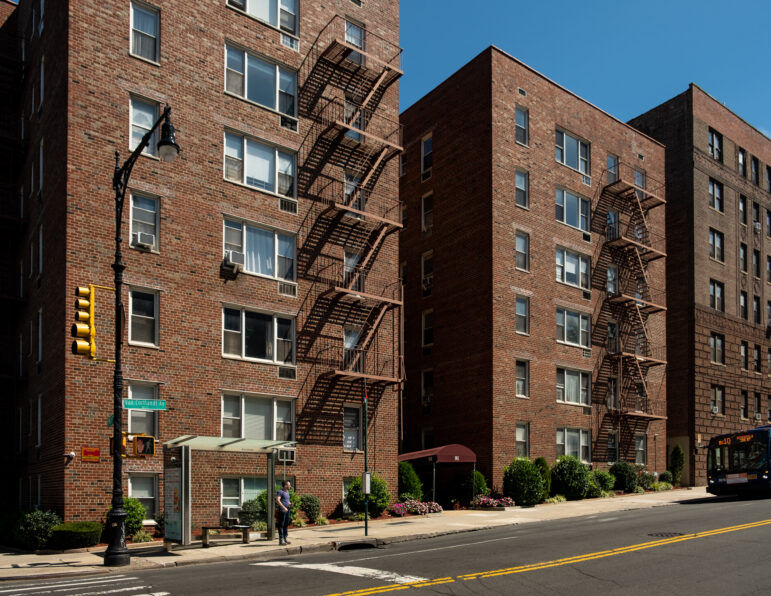
Yes and No: Bills Targeting Illegal Rent Increases Diverge On Governor’s Desk
State lawmakers passed two bills last year intended to help New York City tenants root out—and undo—illegal rent hikes, but only one received Gov. Kathy Hochul’s signature.
Adi Talwar
A rent stabilized building on Van Cortlandt Avenue in the Bronx.
State lawmakers passed two bills last year intended to help New York City tenants root out—and undo—illegal rent hikes, but only one received Gov. Kathy Hochul’s signature.
Just shy of 6 p.m. on the Friday before Christmas, Hochul signed S2980-C, co-sponsored by Senator Brian Kavanagh and Assemblymember Linda Rosenthal, chairs of their respective committees on housing. As written, the legislation ushers in a broad definition of landlord fraud in the context of rent overcharge cases.
The law also locks in recent updates to the Rent Stabilization Code, including limits on rents in combined, or “Frankensteined,” apartments.
“This legislation will help to protect the one million New Yorkers living in rent-stabilized apartments and give our state better, stronger tools to enforce our rent stabilization laws,” Hochul said in a press statement announcing the signing.
Under rent stabilization, tenants have the right to a lease renewal, and landlords generally cannot increase rent beyond an annual allowance. Too-high rent can be the result of a landlord overstating the cost of apartment repairs, or side-stepping regulation by failing to register stabilized apartments with the state.
But that same day, Hochul vetoed S2943-B, co-sponsored by Kavanagh and Bronx Assemblymember Jeffrey Dinowitz, which would have, among other things, clarified how many years of rent records a tenant can review for error absent a fraud allegation.
Prior to the passage of the Housing Stability and Tenant Protection Act (HSTPA), that window was four years. However, Part F of the 2019 law expanded the window to six years, with the cushion that courts can further consider all rent history “reasonably necessary” to determine the legal rent.
Yet a 2020 court decision in a case called Regina curtailed Part F. Under the Dinowitz legislation, tenants would have been able to use the HSTPA standard to determine their legal rent going forward—just not to win back years’ worth of overpaid rent.
In a memo accompanying the veto, Hochul echoed a criticism put forward by landlord trade groups and lawyers, saying the bill could impose unfair consequences for their past actions and hit property owners with “significant rent reductions.”
But Ellen Davidson of the Legal Aid Society, who consulted on both bills, called the veto a “huge loss,” particularly for tenants who identify one suspicious increase in their rent history but don’t see enough in the record to allege a pattern of fraudulent misconduct.
“One would think for a governor who cares about law and order, that would be something of interest to her,” Davidson said. “But unfortunately when it comes to landlord misbehavior she seems to be quite accepting of them being able to keep their ill gotten gains.”
The governor has also negotiated amendments to the bill Kavanagh shares with Rosenthal, which must be introduced and voted on by the Legislature, leaving both proponents and detractors feeling somewhat uneasy.
“Everything is always in the details and the language,” said Sherwin Belkin, a partner with Belkin Burden Goldman LLP, who represents landlords. “Until we see the actual final chapter amendments to the bill, it’s hard to know what the changes are.”
Reached by phone Tuesday, Rosenthal said the amendments will be technical and pertain to the definition of landlord fraud, but did not provide specifics.
“I’m happy the governor signed it,” she said, of her bill. “Of course, you always want the governor to sign exactly how it was passed, but oftentimes it’s a choice between coming together for a compromise or getting a veto. I’m not saying this was at that stage, but there were robust discussions around all aspects of this bill.”
Alleging fraud can allow tenants to explore further into their historical rent history for potential illegal overcharges—beyond the initial four year grace period that the Dinowitz bill sought to expand.
As it stands, Rosenthal’s bill rolls back a precedent applied in a state court case called Burrows: that tenants can’t allege fraud if they have access to their state rent records, because they could have analyzed them and challenged suspicious increases sooner.
“We’re hoping that at the very least Burrows decision gets undone,” said Sue Susman, head of the Central Park Gardens Tenants’ Association. “Tenants can’t do due diligence the way a business could do due diligence. Tenants don’t have that kind of leeway or time.”
Jay Martin, executive director of the Community Housing Improvement Program, a landlord trade group, has been a vocal critic of both bills.
Hochul’s decision to veto one and pass the other is confusing, he said Tuesday, given the similarities between the two. For example, both put the onus on landlords to demonstrate their rents are legitimate—sometimes without certain documents that may have been destroyed under prior law, even by a previous owner.
“The Legislature, being very smart politically, passed two bills with virtually the same language to give themselves two bites at the apple here,” Martin said.
Already, he added, he’s urging his members to start reviewing their records, in anticipation of tenant lawsuits: “Go back as far as you possibly can to confirm rent histories…. If you can’t, flag it to your attorneys.”
Kavanagh also downplayed differences between the bills. A spokesperson for the senator told City Limits that the Rosenthal bill achieved the “core goal” of clarifying the law around rent overcharge cases, and that the veto of Dinowitz’s bill “doesn’t take away from our success working together to achieve that objective.”
But Dinowitz said he was surprised and deeply disappointed by the governor’s veto, which he said will “cost an indeterminate number of tenants large sums of money.”
While he had urged Hochul to sign the bill, he said, there were no collaborative conversations with her team.
“I hope we can do something in this coming session to address the issue,” he told City Limits. “No one should be able to profit from their own fraud, or even their own mistake, either way. And that’s what the veto allows, as far as I see it.”
To reach the reporter behind this story, contact Emma@citylimits.org. To reach the editor, contact Jeanmarie@citylimits.org
The post Yes and No: Bills Targeting Illegal Rent Increases Diverge On Governor’s Desk appeared first on City Limits.

